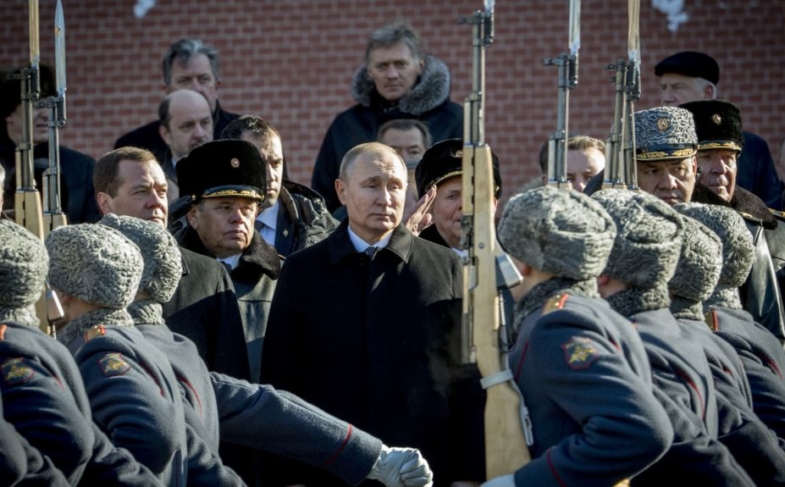The Central African Republic might seem like an unusual venue for Russia’s evolving strategy in Africa. The CAR doesn’t boast Ethiopia’s booming economy or Angola’s deep oil reserves. It lacks a developed mining industry like Zambia or a strategic location like Djibouti.

But the landlocked country of fewer than 5 million people, most of whom survive on subsistence farming, has something else of interest to Moscow: conflict.
Since 2013, the CAR has grappled with a protracted civil war. Mass displacements, political instability, and competing factions of rebels and militia groups have weakened the government and eroded peoples’ trust in its institutions.
In the ensuing volatility, Russia has found opportunities to project power far beyond its borders and rekindle strategic partnerships in Africa that have been dormant since the end of the Cold War.
Russia has stepped up its presence in the CAR in the past few years. But its strategies there, which rely on the use of private contractors and mercenary groups, have been employed since the Yugoslav Wars in the 1990s and, later, in Ukraine and Syria.
“We should think about mercenaries as an instrument which allows plausible deniability but also hard-power projection, which has multiple uses in contested areas,” said Kiril Avramov, a post-doctoral research fellow at the University of Texas at Austin’s Intelligence Studies Project.
Avramov told VOA’s Russian service that Moscow officially bans mercenaries and security companies, but ex-military or intelligence officers often organize them, providing close ties to the Kremlin. Their work, which Avramov called “armed adventurism,” has helped Russia rebound from isolation and advance its political objectives.
One company, Wagner Group, has come under increasing scrutiny. This summer, three journalists investigating Wagner’s operations in the CAR were ambushed and killed. Footage captured by the journalists suggests Wagner may have been assisting both the government and rebels.
Marie-Noëlle Koyara, the CAR’s minister of defence, told VOA’s French-to-Africa service that the Russian journalists had not secured appropriate media credentials from the Ministry of Communication.
“All who arrive here to cover news, no matter what event, they are always welcome, but they have to respect the procedure,” Koyara said.
She hopes authorities can piece together what happened to the slain journalists “to take away lessons.” “We would really like to know the true cause of these assassinations,” Koyara said.
For Russia, private military contractors complement a broader strategy focused on strengthening state sovereignty, Avramov said. “The current Kremlin is trying to export counterrevolution,” he added. Rather than destabilize regimes, Russia looks for countries already besieged, from the CAR to Syria.
These governments welcome help, Avramov said, and that provides Russia with multiple opportunities, from weapons deals to training programs.
In the CAR, Moscow has gone a step further, cementing deals for political consultations, joint foreign operations and security details for the president, Faustin-Archange Touadéra. In the future, mineral mining might present opportunities to “entrepreneurs and their little private armies,” Avramov said, even if the sector is currently underdeveloped.
But the country may be getting more than it bargains for. “You’re going to get what I call the ‘club of illiberals.’ You buy insurance, and then you receive a package,” Avramov said.
That package includes mercenary groups, such as Wagner, which often have ties to both oligarchs and political elites. “You somehow start losing a grasp (on) where the private ends and the state begins,” Avramov said.
Countries also can end up pawns in Russia’s geopolitical ambitions. In the CAR, Russia is “playing in the backyard of France and trying to sow division with the neighbours,” Avramov said.
And while Russia may not want the countries with which it aligns to plummet into chaos, quick resolutions to the battles it inserts itself into aren’t desirable, either. Drawn-out conflict means more time to sell arms, secure energy contracts and counterbalance China.
Despite outpacing Russia in political alliances and economic deals, Beijing faces real competition from Moscow, Avramov said. Compared to China, “(Russia) is punching above its weight, and it’s doing it in a very spectacular manner,” he added.
Two thousand kilometres from the CAR, Moscow sees opportunities in another country dealing with the fallout of war. Eritrea, in East Africa, emerged this summer from decades of active conflict with Ethiopia, followed by 20 years of isolation.
In August, Russian Foreign Minister Sergey Lavrov discussed plans to build a logistics centre at the Port of Assab, in southern Eritrea, during a meeting with a high-level Eritrean delegation, according to RIA, a Russian state-owned news agency.
Avramov said it makes sense for Russia to pursue the base, along with similar partnerships.
“We will see those activities on the rise,” he said, citing Russia’s desire for recognition as a world superpower and its need for diplomatic relationships.
Countries steeped in conflict give Moscow a chance to develop a long-term presence, Avramov added, despite limited resources. They also give the Kremlin a chance to send a message, both to China and the West.
“It’s a way of saying, ‘If you’re criticized for your human rights record, if you’re criticized for any of the things the West clings on, here is always another option,’” Avramov said.
This story originated in VOA’s Africa Division. Sandzhar Khamidov contributed reporting from the Russian service. Idrissa Fall contributed reporting from the French-to-Africa service.
Kindly follow us on twitter:@AfricanVoice2









